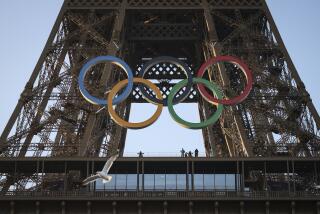Calls Capital ‘City of 2 Faces’ : John Paul Assails Poverty, Other Urban Ills in Rome
- Share via
ROME — Blunt criticism from Pope John Paul II is leading Romans to take a fresh look at the juxtaposition of majesty and misery in the Eternal City.
“A city of two faces,” where wealth and poverty uneasily coexist, was how the Pope characterized his adopted home town. John Paul, like all the popes before him, is the Bishop of Rome.
“Next to immense religious, cultural and human treasures, one can observe symptoms of multiple moral ills, Third World pockets,” he told Rome Mayor Pietro Giubilo and city fathers at an annual audience this week. “There are areas of great wealth and pockets of great poverty. Alongside people who have every type of material wealth exist others who hardly have the essentials.”
As Rome’s bishop, John Paul takes his pastoral responsibilities more seriously than previous popes. In a decade as pontiff he has been in constant motion across a metropolis of 3 million people, visiting the faithful in nearly 400 public appearances at cathedrals and soup kitchens.
The Pope knows a Rome that visitors seldom see, and he spoke bluntly in addressing city politicians whose internal bickering is as well known to Romans as the litany of civic ills.
Slow-Acting Coalition
The Rome city government, microcosm of Italy’s national government, is a slow-acting coalition of five centrist political parties. Urging overdue rationalization of Rome’s bureaucratic tangles, John Paul called for a united and straightforward assault on the problems of housing, poor public services, drug addiction and the city’s forgotten elderly.
Ticking off the have-nots who throng the overcrowded center of Rome, he demanded more humane treatment for illegal immigrants, the homeless, the handicapped, victims of AIDS--acquired immune deficiency syndrome--and Gypsies.
“We didn’t need the Pope to know that Rome is a city that is falling apart,” snapped writer Alberto Moravia, Rome’s premier storyteller, after the papal address.
Rosa Filippini, a Greens member of Parliament, noted that the decay singled out by John Paul is well-known.
“But it’s important that he has said it,” she said. “Isn’t it a Third World situation when 18 immigrant workers sleep in one room, when sewers in newly built suburbs overflow six months after people move into new houses?”
Third World Comparison
Particularly stinging to Roman purists who still feel they are at the center of civilization was the Pope’s Third World comparison. In fact, although it may not be apparent to tourists, the face of Rome is changing.
By municipal count, there are now over 100,000 immigrants in Rome, three quarters of them from Africa and Asia. Only about 20% are in Italy legally, and the city does virtually nothing to help them, according to social researchers.
The Roman Catholic Church is their only friend in the city, operating canteens and helping with jobs and sometimes housing. The Church of St. Sylvester in downtown Rome has become the meeting place for Rome’s large Filipino community. Nearby, migrants from Ethiopia gather around the Gesu Church.
Of Rome’s 600,000 pensioners, many of them needy, those who can count on help from the city “are a mere drop in the bucket,” the newspaper Corriere della Sera has noted. Around the city’s main rail terminal, tramps and bag ladies mingle with homeless people from Africa and Asia. The church tries to help, but seldom the city, say the destitute.
Gypsies periodically cause rowdy municipal debates with their makeshift camps on the outskirts. Thieving Gypsy children who roam the central streets begging and picking pockets are by now a Roman tradition.
Losing the Drug War
Rome is also losing the drug war. In a country where possession of narcotics for personal use is not an offense, used syringes are a common bit of street litter. Last year, there were 85 deaths from drug overdoses in Rome, up from 59 in 1987. The few rehabilitation facilities are mostly run by the church or independent Samaritans.
Talking with reporters after the meeting with John Paul, Mayor Giubilo summoned an indignant self-defense.
“I’m not running away from my responsibilities,” he said, “but how can you attribute such evidently long-standing and . . . well-entrenched evils to a city government that has only been around for six months?”
Rome’s social ills, say Giubilo and other hard-pressed civic leaders, are not peculiar to the Eternal City but are the bane of all large urban centers.
To improve the quality of life, the city promises less traffic congestion in the center, and a major new business and commercial complex in the eastern suburbs that would be a first step toward overdue decentralization.
At the same time, the Italian state will underwrite major infrastructural improvements, particularly in public transport, to prepare Rome as the headquarters of soccer’s 1990 World Cup.
Not much of the big plans impress the Pope’s men and women who labor in Rome’s social and economic underworld.
More to Read
Sign up for Essential California
The most important California stories and recommendations in your inbox every morning.
You may occasionally receive promotional content from the Los Angeles Times.













